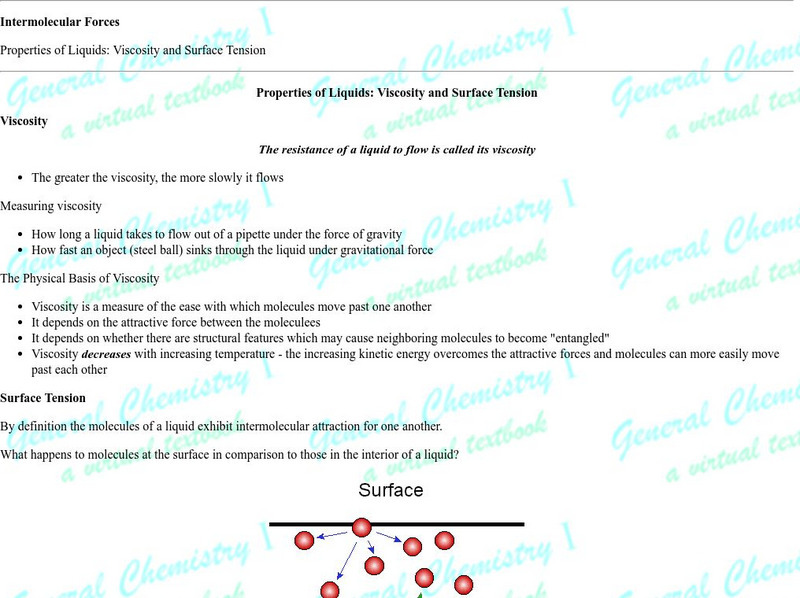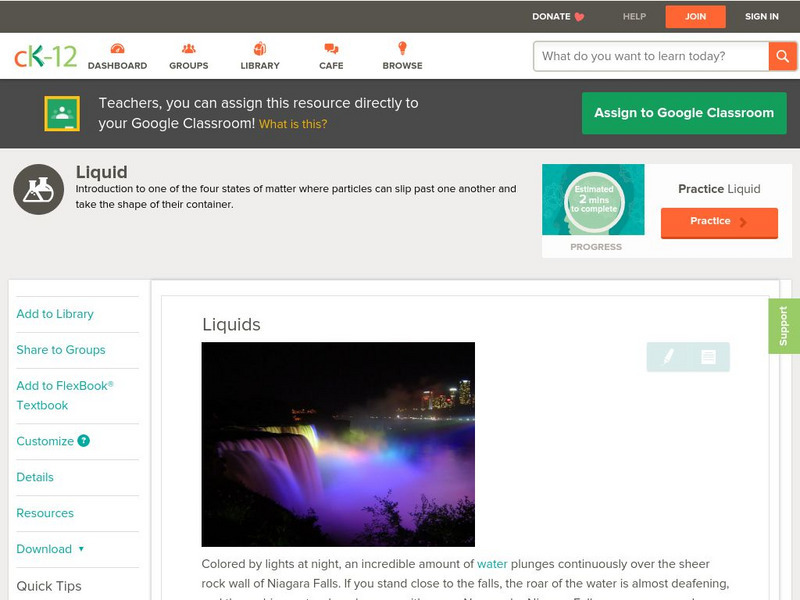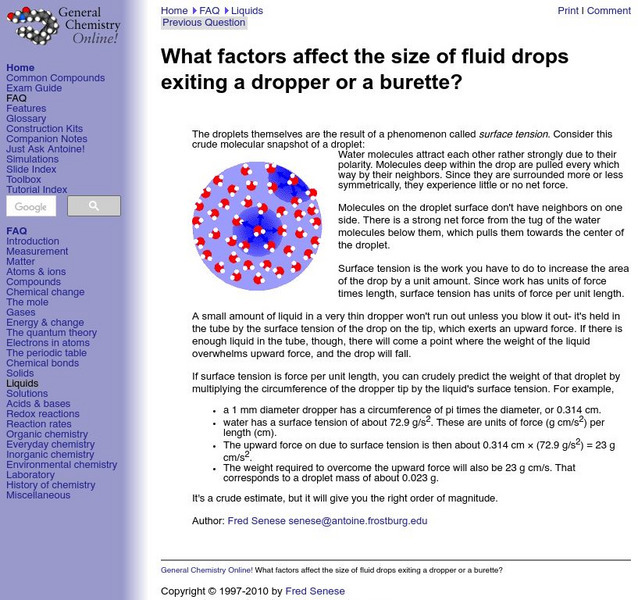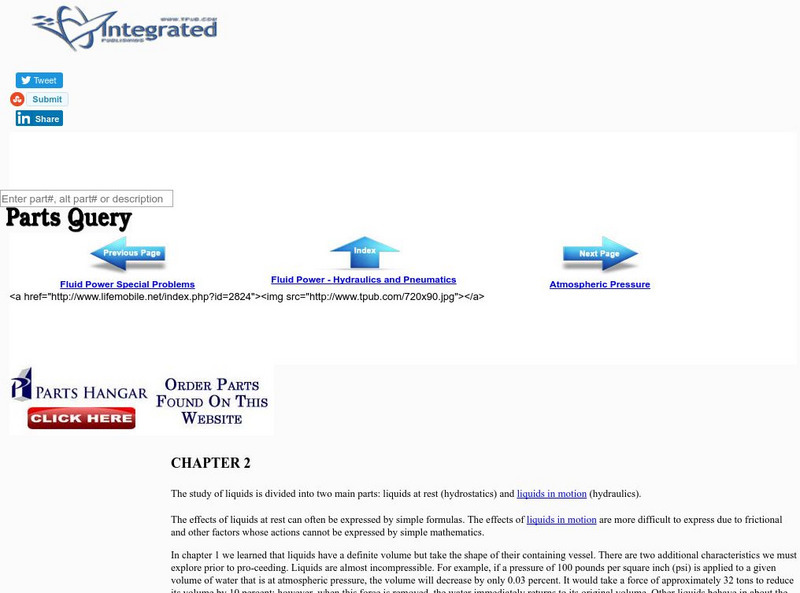Science Education Resource Center at Carleton College
Serc: Investigating Matter: Identifying Properties and States of Matter
In this activity about matter, students investigate the three states of matter by participating in a small group lab. Students will observe, question, and investigate the properties of solids, liquids, and gases.
Simon Fraser University
Chem1 Virtual Textbook: Liquids and Their Vapors [Pdf]
With an overview of the various properties of the states of matter, this 18 page pdf file provides a series of topics related to liquids including special physical properties of liquids, changes of state, and more.
Michael Blaber, PhD
Fsu: Properties of Liquids: Viscosity and Surface Tension
This article from the Florida State University provides a basic definition of viscosity and it origin in liquids.
University of Waterloo (Canada)
The University of Waterloo: The Heating Curve
The heat of vaporization along with several other thermal properties are explained. Sample problems are given. Illustrations.
Channel 4 Learning
4 L: Science Essentials: Material World
Learn about topics related to the material world. Each topic includes facts, a glossary, an interactive quiz, printable worksheets, an image bank, and web links.
CK-12 Foundation
Ck 12: Physical Science: Liquids
[Free Registration/Login may be required to access all resource tools.] Properties of liquid matter.
University of California
Ucsb Chemistry and Biochemistry: Models Matter
Matter of any type can be subdivided into particles that are too small to see, but even then the matter still exists and can be detected by other means. Students will participate in hands-on activities to prove that matter is made up of...
Other
King County Court House: Heating & Cooling Curves [Pdf]
This page is a lab that will teach you about heating and cooling curves.
Other
Beautiful Chemistry: Beautiful Structures: Gas and Liquid
In Beautiful Chemistry, we talk about crystals, quasicrystals and glasses, which are all solids. Here, we see the molecular structure of gases and liquids.
Oklahoma State University
Oklahoma State University: Chem 1215: Periodic Table
Explains different sections of the periodic table, and how they are used.
Frostburg State University
General Chemistry Online: Liquids Faq
Get the answers to many common questions about liquids. Identify properties and phase transitions of liquid shared in this FAQ.
Frostburg State University
Frostberg University: Surface Tension and Droplet Size
Discusses the role of surface tension in determining the size of water droplets. Explanation of why a small amount of liquid in a dropper will never run out.
ArtsNow
Arts Now Learning: States of Matter [Pdf]
In this instructional activity, students will move and generate choreography to understand different states of matter.
Integrated Publishing
Integrated Publishing: Forces in Liquids
Good information on the forces exerted by liquids on the object submersed in them.
Alabama Learning Exchange
Alex: Solids, Liquids, and Gases
This lesson focuses on solids, liquids, and gases. It has several review activities and an exciting lab experiment involving ice cream to complete the lesson.
Alabama Learning Exchange
Alex: Which Came First, Ice Cream or Refrigeration?
As students begin their study of states of matter, this hands-on activity demonstrates how the interaction of a solid and a liquid can reverse the initial state of each material.This lesson plan was created as a result of the Girls...
PBS
Pbs Learning Media: The Ruff Ruffman Show: Teacher's Guide: Kitchen Chemistry
Learn about kitchen chemistry alongside Ruff Ruffman. Learners can use the videos, games, and activities from The Ruff Ruffman Show to discover how by investigating solids and liquids and exploring heating and cooling, science can help...
Energy4Me
Energy4me: Understanding Density
This activity explores the property of density in a variety of liquids and solids.
Concord Consortium
Concord Consortium What Are All Materials Made Of?
Activity 3 of this module explores: Is the particle model always better? Models are considered most useful when a variety of observations can be explained. A model of matter should explain observations of all types of matter. In this...
Concord Consortium
Concord Consortium What Are All Materials Made Of?
Activity 2 of this module explores: Does 5 + 5 always equal 10? In this activity liquids are mixed together and evaluated whether the continuous or particle model of matter provides a better explanation of observations of the behavior of...
Concord Consortium
Concord Consortium: What Makes Water Special?
Activity 2 investigates Why is water different from other liquids? This activity will discover the properties of different liquids. Students will explore what makes honey gooey and thicker than water. And why some liquids evaporate...
PBS
Pbs Learning Media: Phases of Matter: Interactive Lesson
Learn about the three phases of matter, and how the addition and removal of thermal energy (also known as heat) affects them.
Concord Consortium
Concord Consortium: What Makes Water Special?
Students will develop explanations connecting observations of water with properties that water exhibits through the following activities. Activity 1 How are water and other liquids similar? Activity 2 Why is water different from other...
New York University
New York University: States of Water
Use this resource to learn about the three different phases of water; solid, liquid, and gas. What happens to water as it changes into a solid or gas? Includes short and easy to do activity.


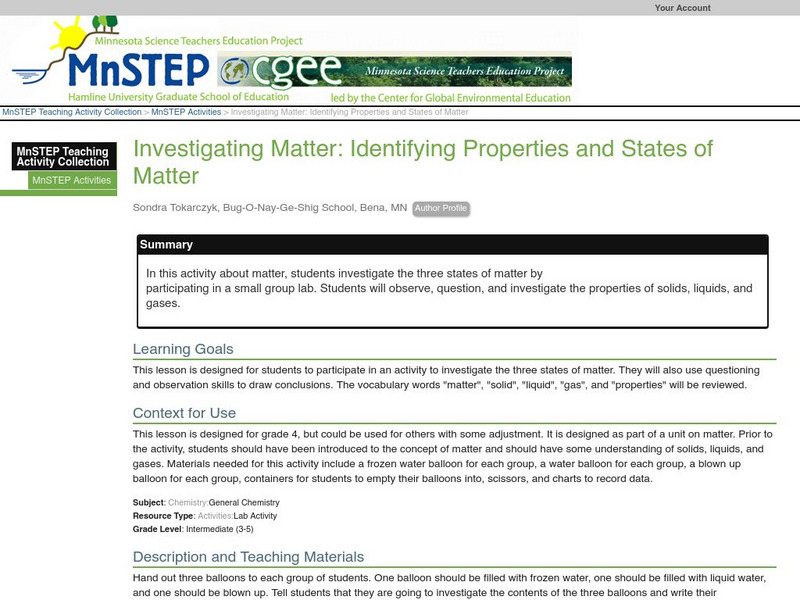
![Chem1 Virtual Textbook: Liquids and Their Vapors [Pdf] eBook Chem1 Virtual Textbook: Liquids and Their Vapors [Pdf] eBook](https://d15y2dacu3jp90.cloudfront.net/images/attachment_defaults/resource/large/FPO-knovation.png)
